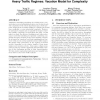Free Online Productivity Tools
i2Speak
i2Symbol
i2OCR
iTex2Img
iWeb2Print
iWeb2Shot
i2Type
iPdf2Split
iPdf2Merge
i2Bopomofo
i2Arabic
i2Style
i2Image
i2PDF
iLatex2Rtf
Sci2ools
MOBIHOC
2009
ACM
2009
ACM
Delay and effective throughput of wireless scheduling in heavy traffic regimes: vacation model for complexity
Distributed scheduling algorithms for wireless ad hoc networks have received substantial attention over the last decade. The complexity levels of these algorithms span a wide spectrum, ranging from no message passing to constant/polynomial time complexity, or even exponential complexity. However, by and large it remains open to quantify the impact of message passing complexity on throughput and delay. In this paper, we study the effective throughput and delay performance in wireless scheduling by explicitly considering complexity through a vacation model, where signaling complexity is treated as "vacations" and data transmissions as "services,"with a focus on delay analysis in heavy traffic regimes. We analyze delay performance in two regimes of vacation models, depending on the relative lengths of data transmission and vacation periods. State space collapse properties proved here enable a significant dimensionality reduction in the challenging problem of delay cha...
| Added | 25 Nov 2009 |
| Updated | 25 Nov 2009 |
| Type | Conference |
| Year | 2009 |
| Where | MOBIHOC |
| Authors | Yung Yi, Junshan Zhang, Mung Chiang |
Comments (0)

